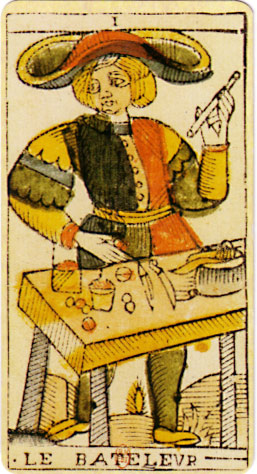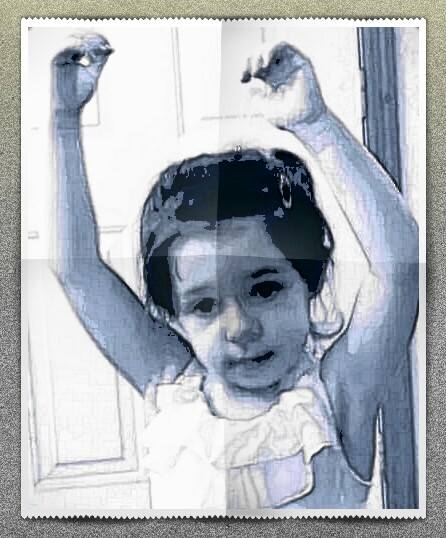 One of the most well-known cards of the Tarot is the Magician, or the Juggler. Every esoteric path begins with the Magician, who teaches that what is essential in the beginning of any journey is learning to accomplish the task at hand with effortless concentration. This effortless concentration, or ‘flow,’ is described by author Mihaly Csikszentmihaly as “being completely involved in an activity for its own sake. The ego falls away. Time flies. Every action, movement, and thought follows inevitably from the previous one, like playing jazz. Your whole being is involved, and you’re using your skills to the utmost.”
One of the most well-known cards of the Tarot is the Magician, or the Juggler. Every esoteric path begins with the Magician, who teaches that what is essential in the beginning of any journey is learning to accomplish the task at hand with effortless concentration. This effortless concentration, or ‘flow,’ is described by author Mihaly Csikszentmihaly as “being completely involved in an activity for its own sake. The ego falls away. Time flies. Every action, movement, and thought follows inevitably from the previous one, like playing jazz. Your whole being is involved, and you’re using your skills to the utmost.”
An artist like Din Yanyong, for instance, studied for many years how to draw and paint detailed still-lifes and animals. Eventually, he could draw a picture of a horse using only one line.
For a pianist, the effortless concentration comes from thousands of hours of practicing scales over and over, until one’s fingers are one with the piano. It’s then that one can freely play.
The poet Robert Frost wrote “Stopping by the Woods on Snowy Evening” after having stayed up one summer night writing a long—and forgettable—poem called “New Hampshire.” Exhausted, he went outside and saw the sun rising, and was suddenly inspired to write a poem “about the snowy evening and the little horse as if I’d had a hallucination in just a few minutes without strain.”
For a writer, after mastery of the craft has been achieved, the concentration without effort often comes from letting go. We are too much in our heads, and when we turn off the switch and simply let go, extraordinary things can happen.
But letting go may be the hardest practice.
One excellent method to help you achieve this is to dance. Seriously. It’s transforming work into play, which is part of the secret of flow. For me, sufi dance—or all middle eastern dancing, for that matter!—is the way I release and join with the flow that tends to get clogged in my writing. There is nothing more transporting than to move to the yearning notes from the ney, the rich strumming of the oud, the resounding zills and darbuka. Whether intensely rhythmic, sorrowful, joyful, profound, the melodies and voices weave through my heart like syrup—sweetening, energizing—and take me out of myself.
The music that moves me may not be the music that moves you. Although I admit I dance to just about anything: Celtic folk songs, Motown, the mournful Japanese koto, African drums, Brazilian samba, Hawaiian hula… you’ll need to choose the sounds that draw out your imagination, as well as getting your toes to tap. It’s not just about your body moving, but your heart moving as well.
It’s about saying thank you.
“I fragrance my dance with prayers of gratitude…an account of all blessings celebrates love over fear…striving for balance with the tasks before me…I seek Divine wisdom in every experience.” Mark deMasi
Dance, when you’re broken open.
Dance, if you’ve torn the bandage off.
Dance in the middle of the fighting.
Dance in your blood.
Dance, when you’re perfectly free.
Writing Practice—Dance
Yes, dance.
Schedule an hour for this. Close the door, turn off the phone, and don’t allow any interruption. Dance the whole time. Sometimes when we used to dance in Stephanie Forest’s legendary classes, much of the dance class was spent lying down with our eyes closed. Sometimes only our hands moved. Still, it was all dancing.
The important thing is to listen, and to let your mind and body be carried by the music. Let your breathing breathe itself, let your body move by itself.
You’ll find, at the end of the hour, that you have a whole new ‘flow’ to your state of being. Dancing reminds you that there’s no separation between mind and body, and the energy that is released is indeed effortless. We tend to focus too much in our heads when we write, and that can create frustration and blockage. Dancing frees us. Even better, it teaches us to transform work into play, to make things easy and light. Writing is a joy.
This week’s task is to enter a state of concentration without effort, where you as a writer become one with your inner self, your pen, your time and space, and the words you write. It’s to recognize this truth: when you’re in the flow, it’s all one.
Even after your hour is up, try to dance as you wash the dishes, dance as you head into the classroom, and dance while you’re talking on the phone or filling your car with gas.
How can we know the dancer from the dance? –William Butler Yeats


